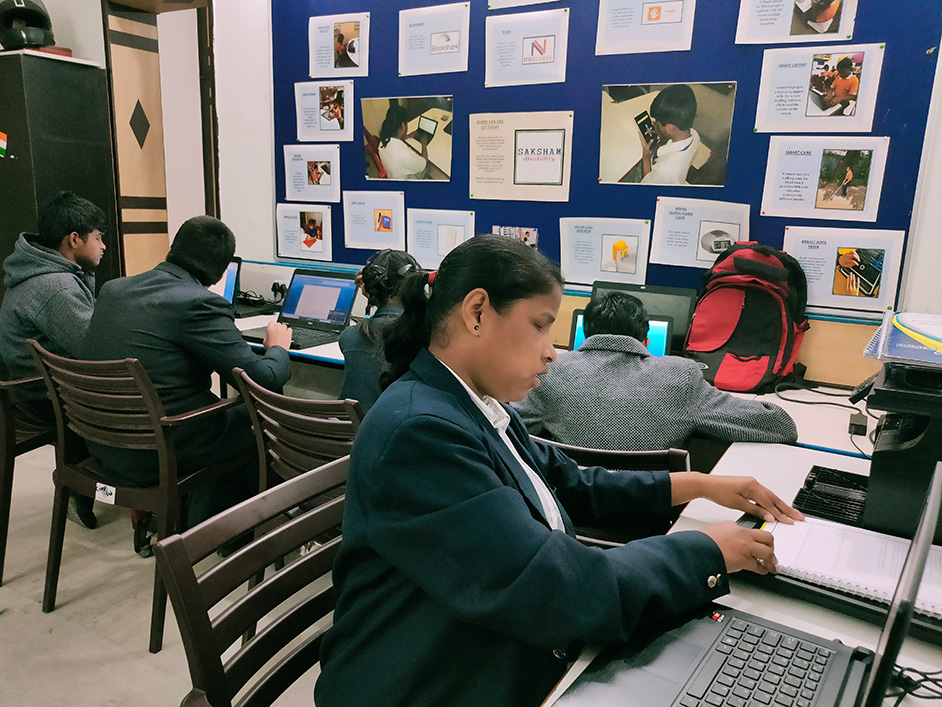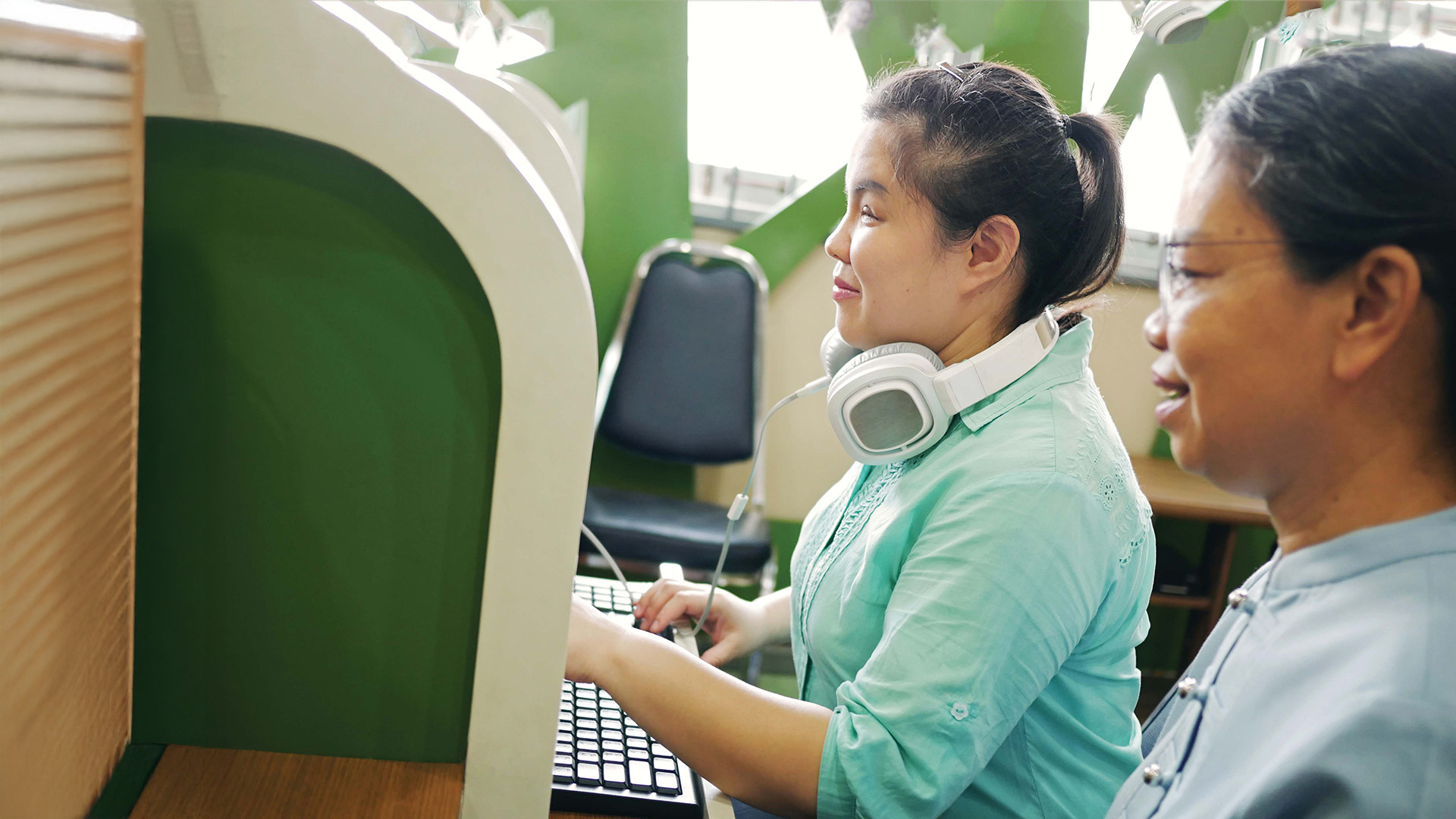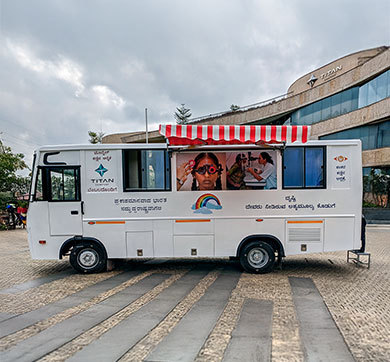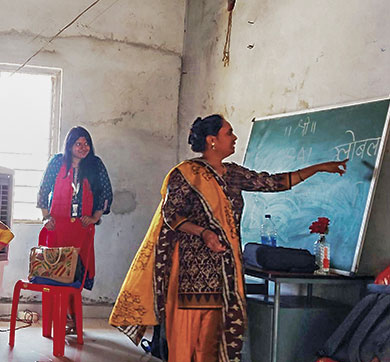May 2025 | 1565 words | 6-minute read
Chhotaudepur, Gujarat. Harshesh Chouhan makes his way through the dusty lanes, past temples and palaces, bracing himself for the gruelling six-hour bus journey to Ahmedabad. Like lakhs of students with print disabilities, forced to rely on human readers to overcome the unavailability of course books in accessible form, this journey was, for him, a quest for independence.
On his return, clutched triumphantly in his hand, his fingers running over the Braille text on the jacket, is the object of that new-found self-reliance — a book. Mr Chouhan’s circumstance is one that is all too familiar for scores of Indians living with blindness or visual impairment — 3.4 crore as per a 2022 Seva Foundation report.
“Access to print is a critical aspect of people’s life,” says Dr Charudatta Jadhav, Principal Scientist and Head of Accessibility Research and Innovation (R&I), Tata Consultancy Services (TCS). “It impacts the journey of an individual from childhood, education and employment. Information is disseminated around us through printed content. Yet, persons with disabilities, especially print disabilities, do not have resources available to consume content independently, which hampers their progress. Not even 1% of the content published in developing countries is available in accessible formats. Globally, the content available in accessible form is less than 5%.”
According to the Accessible Books Consortium (ABC), a completely ‘accessible’ book or reading material is one which allows all readers, regardless of any visual impairments or print disabilities, to fully comprehend and engage with the content it contains. In practical terms, it means offering books in multiple formats, in print, large print, e-book, EPUB, audio and Braille, preferably in embossed and electronic formats. It was this pressing need to create capabilities to make books accessible that led to the formation of TCS’ Accessibility R&I unit in 2014. “As part of TCS’ R&I unit, we always challenge the status quo and do our bit for the community by following Tata values,” says Dr Jadhav. “Creating an equitable world is one of our objectives, with one of our core areas being persons with disabilities. When businesses started getting digitised, the need for accessibility started gaining momentum.”
A fine balance
In 2014, in its quest to bridge the digital divide and create an equitable and inclusive world, the Accessibility R&I unit began examining India’s digital publishing landscape. “We began studying the entire life cycle, from content creation to content dissemination, understanding the challenges of stakeholders,” says Dr Jadhav. “Publishers, who created content, were the primary stakeholders. They viewed accessible content as a needless overhead cost and were unwilling to adopt advanced technologies, expressing concerns about piracy.” For NGOs involved in content production, capacity was limited due to a scarcity of resources.
Other industry challenges included a lack of technology support for regional languages, duplication of content in multiple forms, leading to resource wastage, and achieving last mile connectivity with formats that catered to the diverse needs of readers. “We had to look at how we could gain the trust of stakeholders and solve this problem holistically to create a technology platform that would become the foundation for a national mission to promote print literacy in the country,” says Dr Jadhav. “We needed to create a countrywide ecosystem that would help all these stakeholders contribute, collaborate and create a multiplier effect.” Thus, was born TCS Access Infinity, a multimodal, multichannel technology platform that has transformed the accessible digital publishing landscape in India.

The ecosystem was formally launched in August 2016 under the name Sugamya Pustakalaya, which translates to ‘accessible library’. It is a collaborative initiative between the DAISY Forum of India (DFI), the National Institute for the Empowerment of Persons with Visual Disabilities, and TCS, and is part of the government’s Accessible India Campaign (Sugamya Bharat Abhiyan). Through a zero-cost licence fee, TCS has made its Access Infinity platform available to DFI, which drives the Sugamya Pustakalaya initiative. DFI is a consortium of 100+ entities, including government bodies, educational boards, publishers and NGOs involved in the production and distribution of accessible reading materials for persons with print disabilities.
Tech to the rescue
In keeping with the company’s philosophy of inventing for impact, the Accessibility R&I unit developed an ingenious tool which helps publishers generate real-time accessible content with the click of a button. Using TCS Accessibility Content Publisher (TACP), publishers can convert text in traditional formats such as .txt, .doc, .rtf, .html and .xml into accessible formats such as Braille ready files (.brf), DAISY (text, audio or text and audio synchronised), and EPUB 3 in different languages in an instant. The one-click conversion capability that leverages artificial intelligence (AI) has made it easy and beneficial for publishers to easily adapt to this technology. “We introduced another functionality into this capability only for publishers — after the conversion is completed, the source file, which they had uploaded, gets deleted, taking care of their piracy concerns,” explains Dr Jadhav.
Equality gap
Visually impaired Indians:
- Are 15% less likely to be employed compared to those without visual impairment*
- Earn 20% less than those without visual impairment*
- The World Health Organization reports that vision impairment poses an enormous global financial burden, with ~$411 bn lost in workplace productivity due to poor vision
*According to the Lancet Global Health Commission on Global Eye Health
Another unique anti-piracy feature is the AI-driven audio watermarking or cryptography, which tracks users who have downloaded a particular book. In order to avoid duplication of content, TCS Access Infinity introduced the concept of a single national catalogue containing a list of all the books produced and deployed on the platform. “Because of the visibility of the national catalogue, when the NGOs start production of a new book, they could check if a book was already available or not,” says Dr Jadhav.
TCS also implemented a continuous feedback mechanism through which users can directly communicate with DFI whenever they encountered a problem. “Enhancements happen as per inputs from end users, our partners and our own innovation road map of taking this to the next level,” says Dr Jadhav.
Transcending boundaries
With around 6.8 lakh downloadable books, 50,000 titles across 19 languages, 2 lakh+ pages of educational material, 200+ library partners and 53,000+ urban and rural users, TCS Access Infinity has well and truly revolutionised the process of disseminating inclusive content.
The platform is compliant with national and international copyright laws, including the 2013 Marrakesh Treaty, which is designed to help the exchange of specially adapted texts across international borders. TCS Access Infinity has a built-in application programming interface (API), which connects it to international libraries such as Bookshare, one of the most exhaustive collection of accessible e-books in the world. In 2023, in order to replicate the impact that it had created across India on a global scale and to facilitate a cross-border exchange of information, TCS entered into a partnership with the United Nations’ World Intellectual Property Organization (WIPO). It brought its Access Infinity platform to WIPO’s ABC partner libraries in developing and least developed countries.
“Our partnership with WIPO has two objectives: one, to create a global ecosystem. An API interface connects TCS Access Infinity to the books available on WIPO’s global platform. Second, ABC plans to give our platform to developing countries from Asia, Africa and Latin America to create a similar ecosystem. Currently, two deployments are being carried out in Bangladesh and Sri Lanka,” reveals Dr Jadhav.
Ending the book famine
Sugamya Pustakalaya is an online library that serves as a one-stop shop for those who are blind, visually impaired or have print disabilities. It is now linked with UDID, an integrated system for the issuance of Universal ID and Disability Certificates for persons with disabilities. Available free of cost, this library is accessible from any computer, tablet, mobile phone or ebook reader and includes content in 19 languages and in nine accessible formats, such as DAISY text and Braille ready files. Users can download the content in their chosen format or access it through DAISY tablets, CDs, DVDs and USB. For people with print disabilities preparing for competitive examinations, the library offers a level playing field, making available educational content from leading universities and institutions, along with several newspapers and magazines in real time.
Through this ever-expanding global digital library, TCS Access Infinity has opened up a whole new world of possibilities for countless visually challenged people across the world. It intends to reach 10 lakh registered users by 2025. Aided by the impetus received from the Ministry of Social Justice and Empowerment, plans are also underway to expand this platform and reach 850 schools around India. In the words of Mr Ashwini, a student preparing for the Institute of Banking Personnel Selection Law examination, “Anyone can download his/her favourite book from anywhere in the world.”
A small but giant step towards realising the vision of an inclusive world.
—Sharmistha Choudhury


































